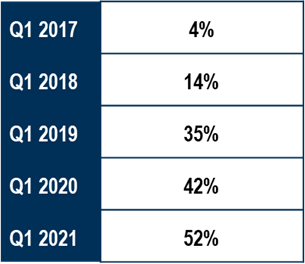The problem: traditionally, between 80 to 90 percent of data generated and collected by organisations is unstructured, meaning either developers have to spend their time reformatting it, or it can’t be stored (in a traditional relational database). This is a big problem as many business documents are unstructured (think emails, videos, photos, webpages, and audio files). Add to the fact that many of today’s most popular websites and apps (think social media) produce an incredible amount of unstructured data.
The solution: MongoDB Atlas. Atlas is a database-as-a-service, hosting and managing a client’s database for them. This dramatically reduces complexity, allowing businesses to focus on creating, not managing. Also, MongoDB Atlas is cloud-based, cutting ownership costs by removing the need for costly on-premise hardware. It also benefits from the trend towards multi-cloud offerings, as a multi-cloud platform it allows unique data distribution and mobility across AWS, Azure, and Google Cloud. As a document database, it allows developers to quickly store large amounts of unstructured data, improving operational efficiency and database performance, and crucially, helping businesses to launch applications faster.






Share